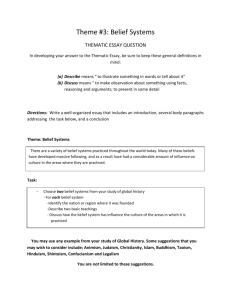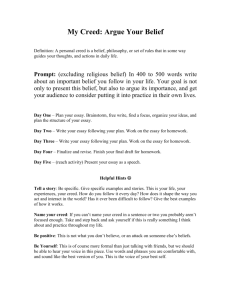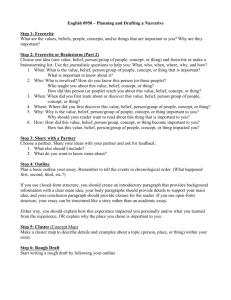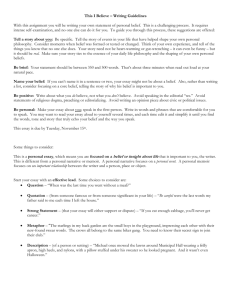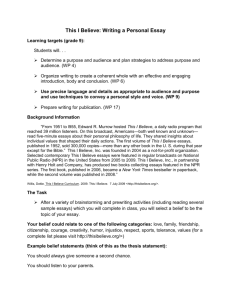“This I Believe” Essay Rubric
advertisement
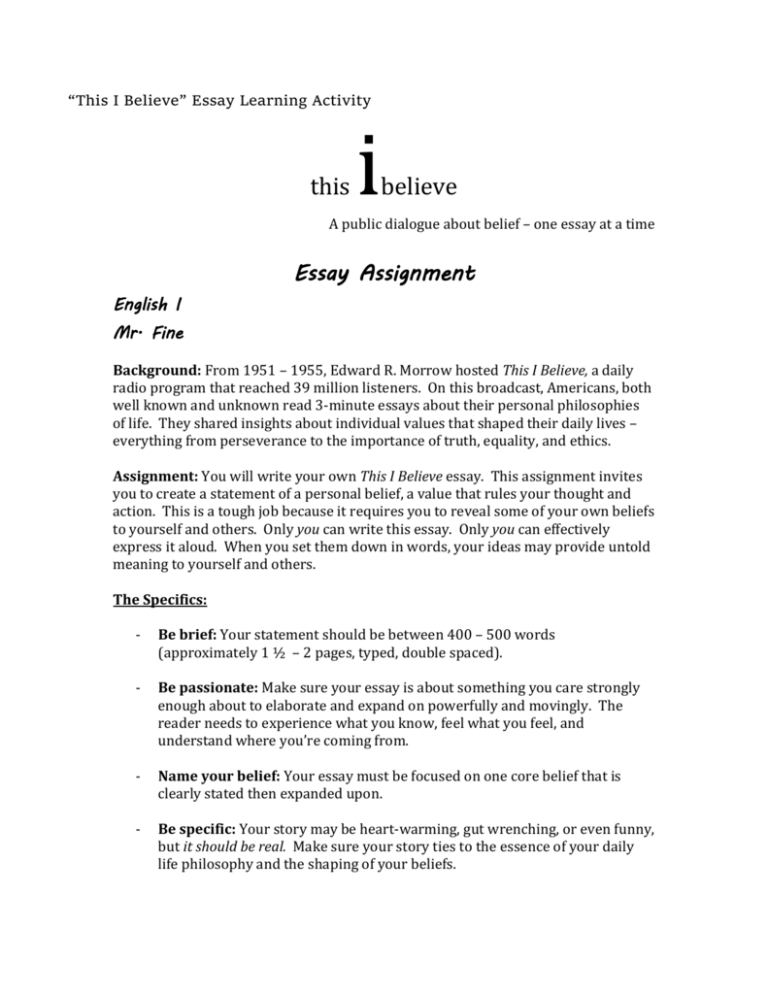
“This I Believe” Essay Learning Activity this i believe A public dialogue about belief – one essay at a time Essay Assignment English I Mr. Fine Background: From 1951 – 1955, Edward R. Morrow hosted This I Believe, a daily radio program that reached 39 million listeners. On this broadcast, Americans, both well known and unknown read 3-minute essays about their personal philosophies of life. They shared insights about individual values that shaped their daily lives – everything from perseverance to the importance of truth, equality, and ethics. Assignment: You will write your own This I Believe essay. This assignment invites you to create a statement of a personal belief, a value that rules your thought and action. This is a tough job because it requires you to reveal some of your own beliefs to yourself and others. Only you can write this essay. Only you can effectively express it aloud. When you set them down in words, your ideas may provide untold meaning to yourself and others. The Specifics: - Be brief: Your statement should be between 400 – 500 words (approximately 1 ½ – 2 pages, typed, double spaced). - Be passionate: Make sure your essay is about something you care strongly enough about to elaborate and expand on powerfully and movingly. The reader needs to experience what you know, feel what you feel, and understand where you’re coming from. - Name your belief: Your essay must be focused on one core belief that is clearly stated then expanded upon. - Be specific: Your story may be heart-warming, gut wrenching, or even funny, but it should be real. Make sure your story ties to the essence of your daily life philosophy and the shaping of your beliefs. - Write with stylistic sophistication!!! Write in a way that shows off your skill using a variety of exciting choices that expand on and reinforce your meaning – helping to add to the beauty and power of your writing. Tips for Writing Your This I Believe Essay: - Introduction: Begin with a powerful hook. Like all good writing, you want your essay to grab the readers’ attention. This could be a bold statement, metaphor, description of a person or setting, etc. - Body: Use details to support your personal philosophy. Be specific, and use details to draw the reader into your experience. Use dialogue, rhetorical questions, anecdotes, personal experiences, examples, and/or statistics so your reader can better relate to what you are writing about. - Conclusion: Summarize the main idea that you believe in a creative and effective way that will bring your personal essay full circle and leave your reader satisfied. - Be positive: Avoid preaching. Tell what you do believe, not what you don’t. Avoid speaking int the editorial, “we.” Speak in the 1st person and make your essay about you. - Be personal: write in words and phrases that would be comfortable for you to speak, but still appropriate for this important task. Read your essay aloud to yourself several times, and each time edit it and simplify it until you find the words, tone, and story that truly echo your belief and the way you speak. Due Date: *Edward R. Morrow once said, “Never has the need for personal philosophies of this kind been so urgent.” This statement remains ever as true today. Your belief, simply and sincerely expressed, will help you and others become better citizens of the world! *CCSS.W.9-10.1a Introduce precise claims in an analysis of substantive topics or texts, using valid reasoning and relevant and sufficient evidence. *CCSS.W.9-10.3 Write narratives to develop real or imagined experiences or events using effective technique, well-chosen details, and well-structured event sequences. *CCSS.W.9-10.4 Produce clear and coherent writing in which the development, organization, and style are appropriate to task, purpose, and audience. *CCSS.L.9-10.1 Demonstrate command of the conventions of standard English grammar and usage when writing or speaking. “This I Believe” Essay Learning Activity Rubric 1 2 3 Thesis/Focus Belief statement is not evident. Multiple beliefs are listed with little development. Core belief is clearly stated with evidence of development. Tells a story that is connected to the belief. Purpose Tells a story that is not connected to the belief or does not tell a story. Tells a story that is somewhat connected to the belief, but is difficult to follow. OrganizationTransition Demonstrates limited or no organization; does not stay on topic; limited or no transitional devices. Demonstrates ineffective organization; attempts to refer to a single topic; transitional devices are limited. Demonstrates organization; maintains focus throughout; uses a variety of transitional devices. Details/ Elaboration Lacks details for the belief or details do not enhance the belief. Limited use of details; details tell rather than show. Effective use of relevant details support the belief; details mostly show rather than tell Point of View Uses second person (you) point of view. Inconsistent use of firstperson point of view. Writer’s Craft - Vocabulary - Voice - Tone - Style • Weak vocabulary; word choice interferes with meaning. • Lacks writer's voice. • Tone is unclear or negative. • Limited or no use of sentence variety. • Basic or limited vocabulary; some incorrect word choice. • Emerging sense of voice. • Tone preaches or judges. • Ineffective use of sentence variety. Mostly consistent use of first-person point of view. • Consistently varied and effective use of vocabulary; clear and appropriate word choice. • Strong sense of voice. • Tone is mostly personal and positive. • Effective use of sentence variety. 4 One core belief is explicit and developed throughout essay. Tells a story that is grounded in the events of everyday life; links to the essence of daily life philosophy and to the shaping of personal beliefs. Demonstrates unique or effective organization; maintains focus throughout; uses a variety of transitional devices uniquely/effectively. Unique, rich, insightful, and effective use of details to support belief; details effectively show rather than tell. Consistent use of firstperson point of view. • Rich vocabulary, vivid language; sophisticated word choice. • Powerful sense of voice throughout piece, appropriate for purpose. • Tone is consistently personal and positive. • Effective use of sentence variety to enhance voice and meaning. Mechanics Errors seriously interfere with meaning. Many errors that sometimes interfere with meaning. Some errors that do not seriously interfere with meaning. “This I Believe” Essay Rubric Overall Score: ________ Few errors that do not interfere with meaning.
